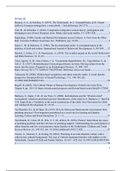Summary
Samenvatting Alle artikelen cultural diversity
- Course
- Institution
Bonjour, S. A., & Scholten, P. (2014). The Netherlands. In A. Triandafyllidou, & R. Gropas (editors), European immigration: a sourcebook. - 2nd edition (pp. 262-271). Crul, M., & Schneider, J. (2010). Comparative integration context theory: participation and belonging in new diverse European citie...
[Show more]



